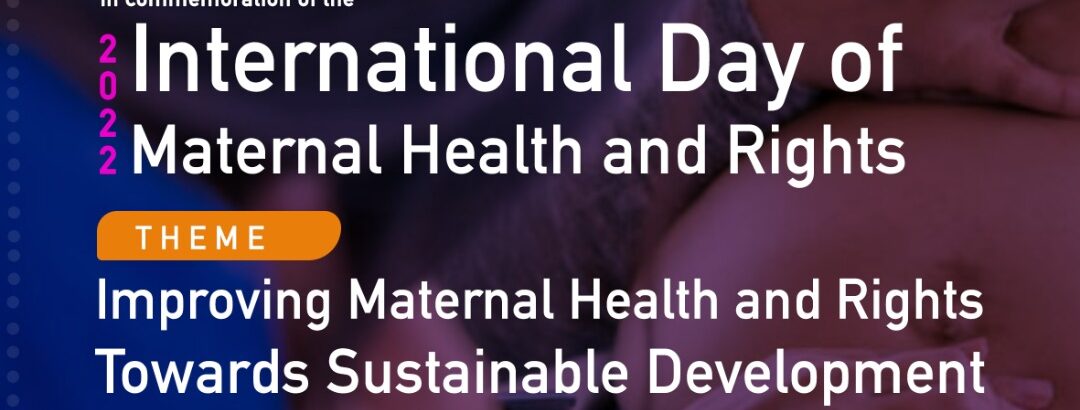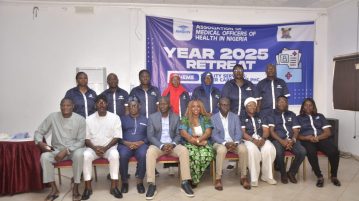Globally, April 11 is a day set aside by international bodies actively involved in the maternal health space to celebrate the International Day of Maternal Health and Rights (IDMH). In Nigeria, this day is usually marked with a Maternal health Summit organised by a non-governmental organisation in Lagos. In preparation of the 2023 IDMH summit, the convening organisation shares the outcome of the previously hosted Maternal Health Summit in 2019 and 2022.
Introduction
Maternal health is not the absence of diseases, but it is a state of wellbeing both in the physical, mental, emotional, social health during pregnancy, childbirth and postnatal period. While Maternal Right is the right of all mothers having access to the same high quality of care anywhere during pregnancy. Furthermore, Maternal death can be defined as the death of a woman while pregnant or within 42 days of termination of a pregnancy, irrespective of the duration and site of pregnancy or its management BUT not from accidental or incidental causes.
Improving Maternal Health and Rights is a major priority towards achieving the Sustainable Development Goal 3- Good health and well-being for all – and SDGs associated. As one of the SDG targets by 2030 is to reduce the global maternal mortality ratio to less than 70 per 100,000 live births. However, currently in the developing nations, over 45 million of the women receive inadequate perinatal care or have no access to antenatal care, with 94% of the global maternal deaths occurring among them.
Specifically in Nigeria, only 40% of the births take place in hospitals, with most deaths or emergencies happening within the first one hour following delivery. Also, a woman’s lifetime risk of maternal death in the country is 1 in 22, which is a rather high maternal mortality ratio causing Nigeria to rank among the lowest 10 on the global healthcare index. This significant maternal mortality is a strong indicator of survival, human development Index and the overall state of the health system in the nation. Which reflects in Nigeria ranking among the lowest performing 10 countries on the global healthcare index with a low human development Index of less than 0.550.
Some of the recognised causes of maternal mortality globally within the healthcare system include Hypertensive disorders (Pre-eclampsia / Eclampsia), Obstetric haemorrhage, Sepsis, Unsafe abortion and others. However, in Nigeria, the major cause of maternal death is Obstetric haemorrhage. And factors attributed to the prevalence of this are: delay in seeking healthcare, delay in accessing healthcare and delay in receiving help from the healthcare centre.
Safer Hands Health Initiative (SHI) is a Youth-led non-government organisation dedicated to the cause of reducing maternal morbidity and mortality in Nigeria and globally; through collaboration, education, training and empowerment of stakeholders and frontline community healthcare providers.
Aim and Objectives
In line with the goal of the organisation and in commemoration of the International Day of Maternal Health and Rights; the SHI Maternal Health Summit is organised yearly as a strategic forum for key players and stakeholders in the maternal and reproductive health space for productive discussions and fostered partnerships towards solving pertinent maternal health issues and sustaining these solutions/outcomes in the country.
Therefore, in 2019 and 2022, the aim and objectives of the summit was to provide participants with an understanding of the current global and national situation, and challenges surrounding maternal health and rights. To critically analyse the deficits and explore the various obstacles existing against improving maternal health and rights. To create a platform for participants to share their field experiences, as well as their ideas for improving maternal health and rights through all feasible means available. To get investments in maternal healthcare (ante- and post-natal) and other core reproductive health aspects (such as family planning) that would help in reducing maternal morbidity and mortality.
Methodology
Key advocates and stakeholders across major areas in the maternal health field were invited as speakers, discussants and panellists among other participants at the SHI Maternal Health Summit. These participants included healthcare professionals – nurses, midwives, community pharmacists, community health physicians, family planning specialists, Obstetricians and Gynaecologists – individuals from maternal health governmental agencies, non-governmental bodies and multilateral organisations, as well as decision makers, media representatives and the general public.
The different speakers and stakeholders were grouped into panels to discuss on different important sub-topics such as: Barriers facing safe motherhood and quality maternal healthcare; Available care for teenage mothers; Role of Skilled Birth Attendants in family planning uptake; Technology-mediated interventions for maternal and perinatal health in Nigeria; Role of Community-Based Primary Health Care and multilateral organisation in improving maternal health and rights; Public Private Partnership for improved maternal health in Nigeria. The discussants for each topic were selected based on their expertise in the field, with a focus on having a balanced representation of public, private, local and international organisations that have direct experience with maternal health initiatives.
Outcome
Between 2019 and 2022, the summit was able to engage about 120 participants and 40 key organisations from different states of the nation for propelling discussions and commitments towards providing quality maternal health solutions that would be applicable, attainable and sustainable by all. After which a report and outcome document was developed for circulation to appropriate authorities for implementation.
Following lectures and discussions during the summits, which included updates on current maternal mortality statistics and state of maternal health outcomes in the nation, review of previous and ongoing interventions, programs and projects. It was established that the maternal mortality ratio in Nigeria was still significantly high despite several ongoing interventions in the maternal and reproductive health space. These could be as a result of unequal distribution of the interventions across different communities and populations, as well as the dissemination of outcomes.
Also, continuous education for all populations involved (without leaving out the adolescents, boys and men, or those in the lower-socioeconomic and culturally biased class or communities) remains the single ultimate key to tackle most of the challenges associated with maternal mortality. Likewise, creating an environment that enables education for women to know more about their health/wellbeing and providing easily accessible, available, affordable and equally respectful quality maternal healthcare for the populations, would significantly improve our maternal health and rights in Nigeria.
Furthermore, specialists and experts shared their experience across their various niche of practice and field of activities, giving practical ways they approached and dealt with issues arising in their maternal healthcare service delivery. While they also responded to other participants’ questions on life scenarios occurring at their place of work or project activities, with workable solutions. Finally, there was a call for (new and renewed) commitments, fostered partnerships and efficient investments into the different discussed aspects of the maternal healthcare sector among stakeholders, to effectively reduce maternal mortality and morbidity rate in Nigeria.
Discussion and Recommendation
From key discussions during the summit, below are some of the recommendations highlighted:
Utilising technology in healthcare services, through means such as telemedicine, virtual expertise review and remote patient monitoring, can help to reduce maternal mortality by providing access to care in areas and communities where healthcare resources are limited. Likewise, “Data” was stated to be important and needed at all levels of care, because having data helps to leverage limited resources, increase speed and improve accuracy to inform maternal care. Also, developing countries such as Nigeria should invest in having a unified medical record system which can help to fast track and improve success of pregnancy, delivery and care afterward. This is because having a detailed record of health helps to avoid risks, and the importance of data and technology cannot be overestimated in the healthcare sector.
However, some of the identified factors that can affect the scaling up and sustainability of these technology interventions for increased maternal health outcomes may include: the availability of resources; prevalence of ignorance, misinformation and cultural barriers among the maternal health population; the acceptance level of the technology in local communities, as well as the effectiveness of the intervention itself.
Nevertheless, beyond these obstacles, for improved maternal healthcare provision and outcomes, public-private-partnerships were stated to be highly important. And the roles of both sectors in providing new, updating and maintaining existing maternal care facilities can be interchanged. As this would maximise improved services delivery (common to privately managed facilities) and reduce facility mismanagement or inadequacies (common in the public institution settings). Some of the emphasised means to achieve these included cross-financing, providing technical support (e.g., data gathering), Insurance and capacity building (for service providers) across sectors, and strengthening of the public-private two-way referral system.
For instance, the provision and movement of blood and ambulance services in cases of obstetric emergencies and other lifesaving procedures – which are mostly blood transfusion reliant – can be a synergistic responsibility between the Government and private facilities. This would be beneficial to every population involved in maternal healthcare, by increasing the scope of reach, availability and accessibility of safe blood and ambulance services. Also, at the level of the community, partnerships with PHCs from all sectors can help to increase screening of pregnant women for communicable and noncommunicable diseases, to provide supportive supervision and readily available referrals for skilled and unskilled community healthcare providers, and to further provide free healthcare services (including provisions of free record system and registration cards) for pregnant women, infants and other vulnerable population towards achieving universal health coverage for sustainable development.
On the highly vital issue of maternal rights in Nigeria and beyond, disrespect and abuse during childbirth is largely under-acknowledged. Abuse in this setting can occur in the form of discrimination, abandonment of care, detainment due to unpaid fees and others. Hence, we must continually protect women from disrespect during maternal care by ensuring sensitive, respectful and caring staff or birth attendants are always available. This reinstates the continuous need for the training and retraining of health care providers, especially the unskilled traditional/community birth attendants, hospital attendants to ensure good behaviour towards women.
Conclusion
Maternal mortality is a developmental indicator and vital marker of the overall health of a society. The use of technology, continuous education, capacity building and public-private-partnerships on maternal health are very important for sustainable development. However, every country including Nigeria has their specific issues and factors affecting maternal health intervention or outcomes. Therefore, it is pertinent for organisations to understand the terrain and system of their host country and communities, which would inform their activities and supportive roles towards improving women’s health and rights. Likewise, communities must be an integral part of partnership programs and involved in the decision making for effective implementation and intervention outcomes.
Acknowledgement
Medical Women’s Association of Nigeria Lagos State Branch (MWAN Lagos) 2021 – 2023 biennium, MWAN National YDF 2021 – 2023 biennium, Society of Gynaecology and Obstetrics of Nigeria (SOGON), Association of Public Health Physicians (APHPN) Lagos, UNFPA Nigeria, Panellists, other speakers and participant organisations, as well as individuals at the summit.
References
Outcome document, Safer Hands Health Initiative Maternal Health Summit 2019
Outcome document, Safer Hands Health Initiative Maternal Health Summit 2022
SHI MATERNAL HEALTH SUMMIT 2022 – YouTube
Safer Hands Health Initiative 2019 Annual Report
Safer Hands Health Initiative 2020 Annual Report
Safer Hands Health Initiative 2021 Annual Report
Safer Hands Health Initiative 2022 Highlights and 2023 Strategic Plans
Health Care Index by Country 2023 (numbeo.com)
United Nations Development Programme (UNDP 2023), Human Development Report, Human Development Index (HDI) Human Development Index | Human Development Reports (undp.org) https://hdr.undp.org/data-center/human-development-index#/indicies/HDI
Editor’s note:
This article was written by Claudia Musa (Program Officer, SHI) and Mary O. Agoyi Awoniyi (Program Manager, SHI and Convener, SHI IDMH Summit). Other Contributors are Roland Ojo (Founder, SHI) and Oyeniyi Blessing (Medical Mirror Correspondent and SHI Volunteer).




Discussion1 Comment
Pingback: International Day of Maternal Health and Rights 2024: Safer Hands set to host annual summit towards addressing Maternal Health issues in Nigeria